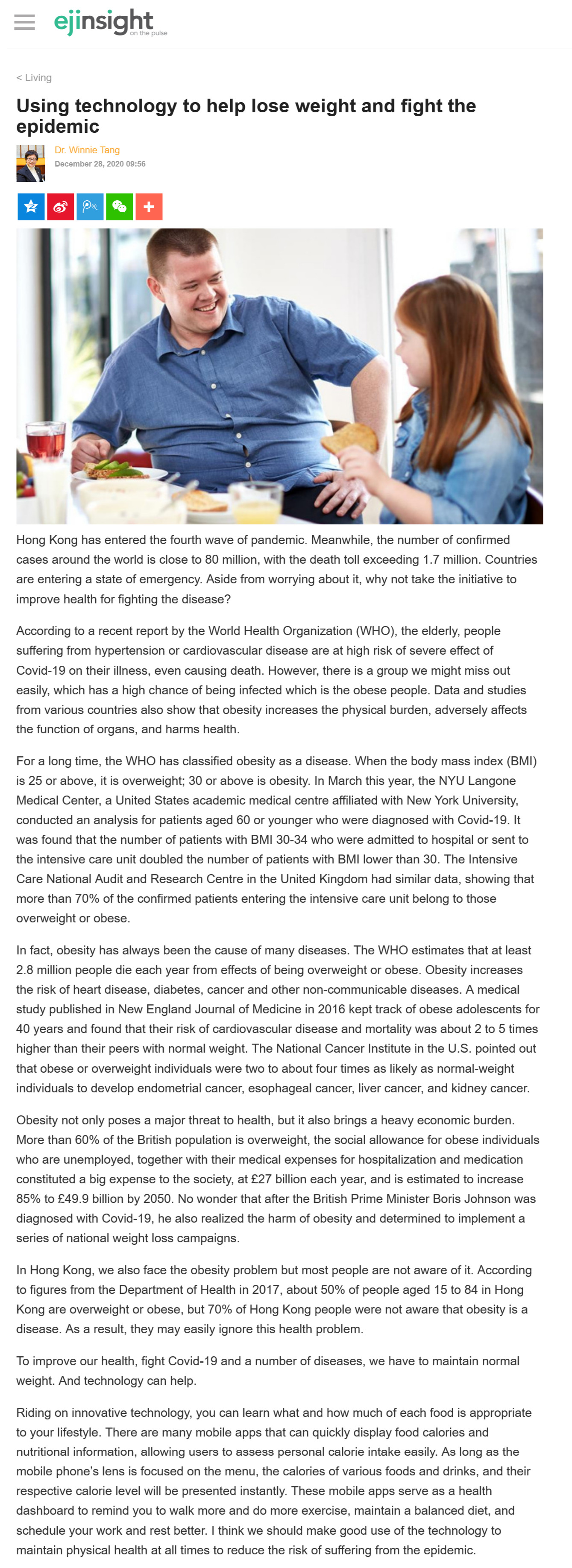網上版請按此

Using technology to help lose weight and fight the epidemic
Hong Kong has entered the fourth wave of pandemic. Meanwhile, the number of confirmed cases around the world is close to 80 million, with the death toll exceeding 1.7 million. Countries are entering a state of emergency. Aside from worrying about it, why not take the initiative to improve health for fighting the disease?
According to a recent report by the World Health Organization (WHO), the elderly, people suffering from hypertension or cardiovascular disease are at high risk of severe effect of Covid-19 on their illness, even causing death. However, there is a group we might miss out easily, which has a high chance of being infected which is the obese people. Data and studies from various countries also show that obesity increases the physical burden, adversely affects the function of organs, and harms health.
For a long time, the WHO has classified obesity as a disease. When the body mass index (BMI) is 25 or above, it is overweight; 30 or above is obesity. In March this year, the NYU Langone Medical Center, a United States academic medical centre affiliated with New York University, conducted an analysis for patients aged 60 or younger who were diagnosed with Covid-19. It was found that the number of patients with BMI 30-34 who were admitted to hospital or sent to the intensive care unit doubled the number of patients with BMI lower than 30. The Intensive Care National Audit and Research Centre in the United Kingdom had similar data, showing that more than 70% of the confirmed patients entering the intensive care unit belong to those overweight or obese.
In fact, obesity has always been the cause of many diseases. The WHO estimates that at least 2.8 million people die each year from effects of being overweight or obese. Obesity increases the risk of heart disease, diabetes, cancer and other non-communicable diseases. A medical study published in New England Journal of Medicine in 2016 kept track of obese adolescents for 40 years and found that their risk of cardiovascular disease and mortality was about 2 to 5 times higher than their peers with normal weight. The National Cancer Institute in the U.S. pointed out that obese or overweight individuals were two to about four times as likely as normal-weight individuals to develop endometrial cancer, esophageal cancer, liver cancer, and kidney cancer.
Obesity not only poses a major threat to health, but it also brings a heavy economic burden. More than 60% of the British population is overweight, the social allowance for obese individuals who are unemployed, together with their medical expenses for hospitalization and medication constituted a big expense to the society, at £27 billion each year, and is estimated to increase 85% to £49.9 billion by 2050. No wonder that after the British Prime Minister Boris Johnson was diagnosed with Covid-19, he also realized the harm of obesity and determined to implement a series of national weight loss campaigns.
In Hong Kong, we also face the obesity problem but most people are not aware of it. According to figures from the Department of Health in 2017, about 50% of people aged 15 to 84 in Hong Kong are overweight or obese, but 70% of Hong Kong people were not aware that obesity is a disease. As a result, they may easily ignore this health problem.
To improve our health, fight Covid-19 and a number of diseases, we have to maintain normal weight. And technology can help.
Riding on innovative technology, you can learn what and how much of each food is appropriate to your lifestyle. There are many mobile apps that can quickly display food calories and nutritional information, allowing users to assess personal calorie intake easily. As long as the mobile phone's lens is focused on the menu, the calories of various foods and drinks, and their respective calorie level will be presented instantly. These mobile apps serve as a health dashboard to remind you to walk more and do more exercise, maintain a balanced diet, and schedule your work and rest better. I think we should make good use of the technology to maintain physical health at all times to reduce the risk of suffering from the epidemic.
Dr Winnie Tang
Adjunct Professor, Department of Computer Science, Faculty of Engineering; Department of Geography, Faculty of Social Sciences; and Faculty of Architecture, The University of Hong Kong